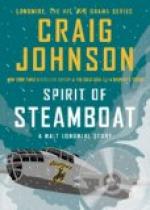[Footnote 10: Mittens.]
“I found a big hummock an’ sheltered under it, standun on my feet, wi’ nawthun to do but think, an’ think, an’ pray to God; an’ so I doned. I could n’ help feelun to God then, surely. Nawthun to do, an’ no place to go, tull snow cleared away; but jes’ drift wi’ the great Ice down from the Nothe, away down over the say, a sixty mile a day, mubbe. I was n’ a good Christen, an’ I could n’ help a-thinkun o’ home an’ she I was troth-plight wi’, an’ I doubled over myself an’ groaned,—I could n’ help it; but bumby it comed into me to say my prayers, an’ it seemed as thof she was askun me to pray (an’ she was good, Sir, al’ays), an’ I seemed all opened, somehow, an’ I knowed how to pray.”
While the words were coming tenderly from the weather-beaten fisherman, I could not help being moved, and glanced over toward the daughter’s seat; but she was gone, and, turning round, I saw her going quietly, almost stealthily, and very quickly, toward the cove.
The father gave no heed to her leaving, but went on with his tale:—
“Then the wind began to fall down, an’ the snow knocked off altogether, an’ the sun comed out; an’ I sid th’ Ice, field-ice an’ icebargs, an’ every one of ’em flashun up as ef they’d kendled up a bonfire, but no sign of a schooner! no sign of a schooner! nor no sign o’ man’s douns, but on’y ice, every way, high an’ low, an’ some places black water, in-among; an’ on’y the poor swiles bawlun all over, an’ I standun amongst ’em.
“While I was lookun out, I sid a great icebarg (they calls ’em) a quarter of a mile away, or thereabouts, standun up,—one end a twenty fathom out o’ water, an’ about a forty fathom across, wi’ hills like, an’ houses,—an’ then, jest as ef ‘e was alive an’ had tooked a notion in ’e’sself, seemunly, all of a sudden ‘e rared up, an’ turned over an’




